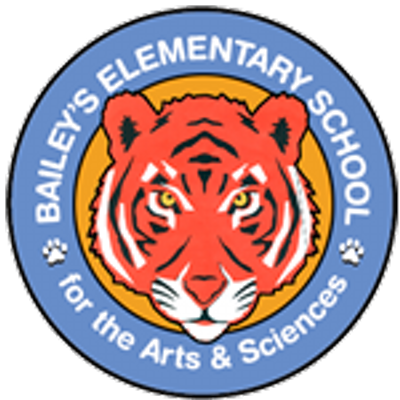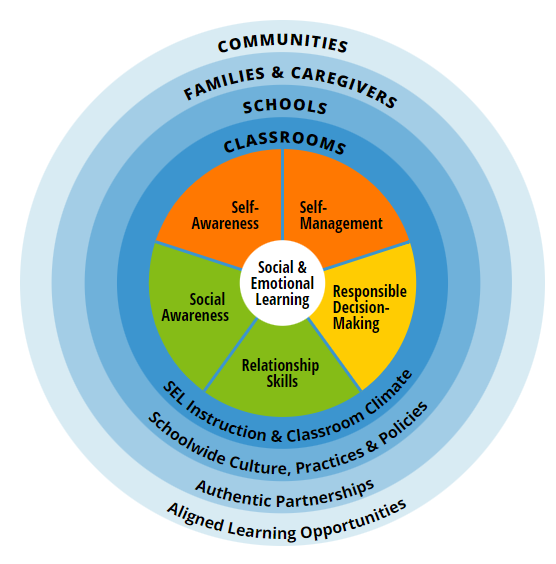Social and Emotional Learning (SEL)
Families as Partners
Social and emotional learning (SEL) occurs at home and school. Families are our student’s first teachers for social and emotional skills. Families continue to be important partners with schools. Together, they work to build social and emotional skills in the classroom and beyond. Examples of these social and emotional skills include:
- developing healthy identities
- understanding and managing emotions
- achieving goals
- feeling and showing empathy for others
- establishing and maintaining relationships
- making responsible decisions
This image shows CASEL's breakdown of SEL competencies for students.
The following resource will help you prepare for a conversation with your student about the results of the SEL screener. These results are a report of your student's experiences at a particular moment in time. This is not a stand alone assessment. The SEL screener provides another source of information in addition to what you already know about your student.
You may be in touch with your child’s school to partner on next steps as needed. Schools can help support the growth of SEL skills and wellness for all students this school year.
Supporting Your Student’s Social Emotional Learning
Students have different learning strengths and needs. Consider how they learn best. Here are some tips for connecting with your student.
- Share with your student strengths noted in their report. Point out strengths you notice in daily life.
- Ease into a conversation with sentence starters using words, pictures, or symbols.
- Try “I feel __________ because ___________.” or
- “I notice you do (insert a skill) well. What do you think you do well?”
- Offer your student choices to support their learning and decision making.
- “When you were at ______what made you feel happy/sad/frustrated?”
- “Was it easy or hard for you to say hello to (name a friend) today?
- Use pictures to support your conversation and explain ideas that might be new. Create charts using words or symbols to help reinforce ideas. Visuals might include:
- Feeling words or pictures
- Coping ideas (i.e., music, taking a quiet break, asking for help, etc.)
- Family and school routines or schedules
- Use pictures of family members and friends when talking about relationships.
- Use examples from real-life experiences, books, and movies to explain new ideas.
Conversation Starters & Skill Building Strategies
Here are some conversation starters and strategies to support the growth of your student's SEL skills. This information is organized by SEL Screener domains and topics. You may find that you will move naturally between topics as you talk, or that you cover more than one topic at a time. Here are some conversation starters and strategies to support the growth of your student's SEL skills. This information is organized by SEL Screener domains and topics. You may find that you will move naturally between topics as you talk, or that you cover more than one topic at a time.
DOMAIN: Supports & Environments
The environment in which students learn, which influences their academic success and social-emotional development.
Topic: Belonging
Topic: Belonging
How much students feel that they are valued members of the school community.
For younger students:
-
Ask your student, “Who are your friends?” “Who did you play with today?” “Who makes you feel happy? loved? safe?”
-
Playing with others fosters a sense of belonging and connection. Try these ideas to Play at Home from Playworks.org
For older students:
-
Ask your student about their connections with others at school and in the community. What do they value in their connections with others?
-
Spend time with your student enjoying preferred activities or learn something new together.
Topic: Supportive Relationships
Topic: Supportive Relationships
How supported students feel through their relationships with friends, family and adults at school.
For younger students:
- Talk about what makes a good friend. Point out examples of healthy relationship skills in real life, books or television.
- Share an example of a time when your student included someone else in play or someone included them in play. Ask them to think of more.
For older students:
- Ask your student, “Who can you ask for help? '' or “Who is in your support system?”
- Take time to check in as a family. Sharing daily highs and lows is a quick and meaningful way to connect even when schedules are busy.
Topic: Cultural Awareness and Action
Topic: Cultural Awareness and Action
How well a school supports students in learning about, discussing, and confronting issues of race, ethnicity, and culture.
For younger students:
- Ask your student, “What makes you unique?” “How can your talents or traits help others?” Types of Strengths in Kids by Understood.org outlines a wide range of talents.
- Work on perspective taking by discussing how other people might feel. Use stories or real life examples. “How do you think that person is feeling? “Why might they feel that way?”
For older students:
- Celebrate and respect individual, family and community identities and cultures. Explore traits and values that are important to individuals or groups. Ask, “What beliefs, values, or experiences make your home, school or community exceptional?”
- At home, practice active listening (Actforyouth.org). Start a conversation. Allow family members to take turns and share their thoughts. Allow time to reflect on what each member has to say. Encourage others to ask questions without judgement.
Topic: Valuing School
Topic: Valuing School
How much students feel that school is interesting, important, and useful.
For younger students:
- Ask your student about school. “What are you learning about in school?” “What is going well?” “What is challenging?”
- Explore critical and creative thinking at home. Check out these resources from FCPS Advanced Academic Programs.
For older students:
- Ask your student, “What or who inspires you at school?” “What do you enjoy learning about? “What classes might help you achieve your future goals?”
Explore careers related to your student’s interests. Check out these resources from FCPS College and Career Readiness.
DOMAIN: Skills and Competencies
The social, emotional, and motivational skills that help students excel in school, career and life.
Topic: Relationship Skills and Social Awareness
Topic: Relationship Skills and Social Awareness
How efficiently students establish and maintain healthy and supportive relationships, understand the perspectives of and empathize with others and effectively navigate settings with diverse individuals and groups.
For younger students:
- Ask your student, “What do you like most about working with others at school? “What is hard or challenging about working with others? Working in a group?”
- Use real life opportunities for perspective-taking. For example, when in the store or in the community, talk about what others might be feeling or thinking.
For older students:
- Ask your student, “What strengths do you bring to relationships with others?”
- “What does it mean to care for someone else? “How can you show someone you care about them? “How can others show you they care?
For more ideas, explore Greater Good in Education (GGIE) Berkeley SEL for Students: Social Awareness and Relationship Skills
Topic: Self Management
Topic: Self Management
How well students manage their emotions, thoughts, and behaviors effectively in different situations and to achieve goals and aspirations.
For younger students:
- Ask, “What do you do to feel better when you are sad, frustrated or mad?”
- Share times that family members have experienced being sad, frustrated, or mad. What did they do to feel better?
For older students:
- Ask your student, “What do you do when things don’t go as planned?”
- Create family goals. Set a goal for the end of the week and another for the end of the month or year. Write down the steps needed to achieve the goal. Reflect on your progress as a family.
For more ideas, explore GGIE Berkeley: SEL for Students: Self Awareness and Self Management
Topic: Responsible Decision Making
TOPIC: Responsible Decision Making
How effectively students make caring and constructive choices about personal behavior and social interactions across diverse situations.
For younger students:
- Ask your student, “How often do you have to make choices at school? What kinds of choices do you have to make?”
- Provide opportunities at home that encourage everyday choice making. For example, picking an activity during family time, a book, or an outfit. Model considering the pros and cons of each option as you make your final decision.
For older students:
- Ask your student, “When have you faced a challenging problem? “How did you make your decision?”
- Share examples of real life problem solving. Identify the problem and discuss the pros and cons of possible solutions.
For more ideas, explore GGIE Berkeley SEL for Students: Ethical Decision Making and Social Responsibility
DOMAIN: Well-being
Well-being refers to students' positive and challenging feelings, as well as how supported they feel through relationships with others.
Topic: Positive and Challenging Feelings
TOPICS: Positive and Challenging Feelings:
How frequently students feel positive and challenging emotions.
For younger students:
- Describe how emotions might feel in your body and show in your facial expressions. For example, “When I’m happy, I smile and sometimes I clap! When I’m mad, my heart beats fast and my face feels hot.”
- Ask your student, “What makes you feel happy, calm, sad or frustrated? How do you let others know what you are feeling?” “Who will you go to for help when you need it?”
For older students:
- Allow for space and time to share experiences and feelings. Acknowledge your student’s experience and feelings in a situation.
- Ask, “How do you know when you need help? Who can you ask for support?”
For more ideas, check out FCPS Student Wellness Tips and FCPS Healthy Minds Blog
Additional Resources and Supports
For more ideas, take a look at these resources:
-
EdSurge.com 10 Ways Parents Can Bring Social Emotional Learning Home
-
CASEL Our Children Are Leaders
-
Panorama Ed SEL At Home
Mental Health Resources & Supports
All schools have school-based mental health staff who can support your child. Please contact your school's social worker, school psychologist, or school counselor if you have questions about the screener or how skills are addressed.
If you have concerns about your student's safety and/or believe that they are in crisis, immediate support is available. Please use the emergency resources below.
Mental Health and Emergency Services Information
- Call 911 in case of a life threatening emergency; TTY dial 711
- CrisisLink Regional Hotline: 703-527-4077 CrisisLink is a hotline for individuals in crisis or family/friends seeking guidance for how to help a loved one.
- Crisis Text: Text NEEDHELP to 85511


